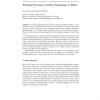Free Online Productivity Tools
i2Speak
i2Symbol
i2OCR
iTex2Img
iWeb2Print
iWeb2Shot
i2Type
iPdf2Split
iPdf2Merge
i2Bopomofo
i2Arabic
i2Style
i2Image
i2PDF
iLatex2Rtf
Sci2ools
108
click to vote
GFKL
2006
Springer
2006
Springer
Putting Successor Variety Stemming to Work
Stemming algorithms find canonical forms for inflected words, e. g. for declined nouns or conjugated verbs. Since such a unification of words with respect to gender, number, time, and case is a language-specific issue, stemming algorithms operationalize a set of linguistically motivated rules for the language in question. The most well-known rule-based algorithm for the English language is from Porter [14]. The paper presents a statistical stemming approach which is based on the analysis of the distribution of word prefixes in a document collection, and which thus is widely language-independent. In particular, our approach addresses the problem of index construction for multi-lingual documents. Related work for statistical stemming focuses either on stemming quality [2,3] or on runtime performance [11], but neither provides a reasonable tradeoff between both. For selected retrieval tasks under vector-based document models we report on new results related to stemming quality and collect...
Data Mining | GFKL 2006 | Statistical Stemming Approach | Statistical Stemming Focuses | Stemming Algorithms |
| Added | 23 Aug 2010 |
| Updated | 23 Aug 2010 |
| Type | Conference |
| Year | 2006 |
| Where | GFKL |
| Authors | Benno Stein, Martin Potthast |
Comments (0)

